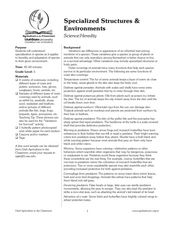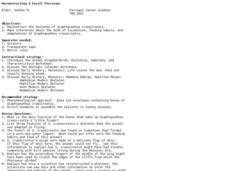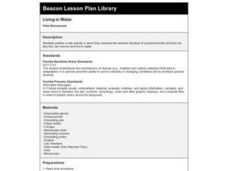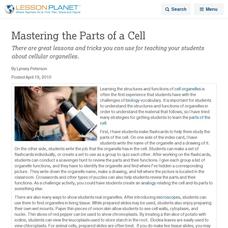Cornell University
Shedding a "Little" Light on Cancer Surgery
Many types of cancer treatments now depend on nanotechnology—a big "little" discovery. Scholars begin by removing "malignant" tissue from simulated brains, one using fluorescent markers thanks to nanotechnology and one without. This...
Curated OER
What Makes Bones Strong?
Learners explore the function of bone, muscle, and skin. Pasta and rubber bands are used to model how minerals and collagen contribute to bone strength. The effects of the reduction of these substances are explored in chicken bones.
Curated OER
Health-Nervous System Review
In this nervous system instructional activity, students are given seventeen clues about structures of the nervous system and they put their answers in a crossword puzzle.
Curated OER
Specialized Structures and Environment
Fifth graders read about how different animals protect themselves, and how characteristics give animals an advantage in their environment. Students then discuss a variety of "outer" wear for humans, and what they might choose to wear in...
Serendip
UV, Mutations, and DNA Repair
How effective are cells at repairing UV damage? An inquiry-based lesson has learners experiment with organism by exposing them to various levels of UV light and then examining their DNA after a period of time. Pupils test different...
Curated OER
The Case of Regulation in Cells
After your biologists have learned about transcription, translation, and gene regulation, they work in a small group to create a poster of a system that serves as an analogy of the gene regulation process. They share their creations with...
Curated OER
Reconstructing a Fossil Pterosaur
Students reconstruct the skeleton of the fossil Scaphognathus crassirostis. In this fossil lesson plan, students discuss the Kingdoms of life, geologic history and the history of the skeletons of species. Students are given 20 minutes to...
Curated OER
Activities of the Immune System (Activity 1)
Students cut an apple in half and cover half with plastic wrap. They place drops of liquid on each half and discover how our skin protects us. They answer discussion questions to end the lesson.
Curated OER
Mapping the Homunculus
Students determine the relative number of nerve endings located in the skin. By calculating the reciprocal of these measurements, students have the appropriate data for predicting the relative size of the homunculus found on the cerebral...
Curated OER
Cellular Cellebrities
Sixth graders, in groups, learn the morphology and function of organelles within plant and animal cells.
Curated OER
The Excretory System
In this excretory system worksheet, learners describe the functions that the organs of the urinary system perform and what happens when the kidneys do not work properly. Students also name the excretory organs of the body and explain why...
Curated OER
Fighting Infection
Pupils study immune responses and the structures that are related to immune cells functions. In this fighting infection lesson plan students construct antibody complexes and model the interaction of the immune system when it is...
Curated OER
DNA
Students explore the basics of DNA and its history. In this DNA lesson students extract DNA from fruits and understand how it is used in forensics.
Curated OER
Living in Water
Fourth graders perform a lab activity in which they examine the external structure of a preserved fish and find out why fish can survive and live in water. They perform a lab which is guided by a worksheet imbedded in this plan.
Curated OER
Using the Microscope
Students demonstrate their ability to properly make observations using a compound microscope. They prepare an onion skin slide and focus on it in both low and high power. Then they measure the diameter of one of the cells.
Curated OER
Proteins
Vocabulary that is essential to this topic is introduced and defined at the start of this slide show. The following slides help students understand proteins and their use and involvement in everyday substances. Great diagrams help your...
Nuffield Foundation
Dissection of the Ventilation System of a Locust
Jiminy cricket! If you find yourself plagued by fear of dissection, these locust respiratory system dissection directions will walk you through everything you need to know. Teens inspect a living locust to begin with, then jump over to...
Curated OER
Reptiles and Amphibians
Introduce your class to various reptiles and amphibians. They will meet and identify a representative from each of the four major reptile families, then learn about and discuss reptile characteristics. Next, they will identify and...
Curated OER
Surface to Volume Ratios
Students measure the rate of diffusion and to calculate the surface area to volume ratios of varying cell sizes. The lesson is very clearly organized with a useful student worksheet provided. They perform a lab experiment which is...
Curated OER
Pliable Proteins
Students make models of protiens using wire and paperclips. They are given step by step instructions with lots of information about proteins throughout the directions. They make the three basic structual elements of proteins;...
Curated OER
Mastering the Parts of a Cell
There are great lessons and tricks you can use for teaching your students about cellular organelles.
Curated OER
Investigating the Method by Which the Body Defends Against Pathogens
High schoolers explore disease caused by bacteria and viruses, how they are transmitted, and how they exert their effects on their hosts. They explain how diseases, such as AIDS, are spread by exponential growth.
Curated OER
x-rays - the Letter X
Students demonstrate the ability to draw vertical, horizontal, and diagonal lines, recognize the difference between inside and outside, and create a picture of themselves.
Ask a Biologist
The Many Faces of Ants
Though they be but little, they are fierce! Young biologists read about eight different species of ants, and discover how the anatomy of their heads can explain the way they live and what they eat.























